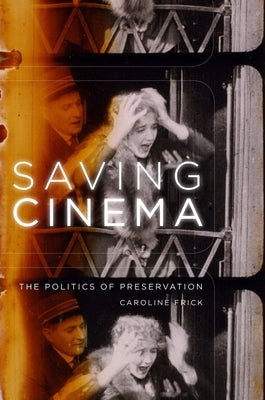1
/
of
1
Oxford University Press, USA
Saving Cinema: The Politics of Preservation
Saving Cinema: The Politics of Preservation
Regular price
€39,95 EUR
Regular price
Sale price
€39,95 EUR
Shipping calculated at checkout.
Quantity
Couldn't load pickup availability
The importance of media preservation has in recent years achieved much broader public recognition. From the vaults of Hollywood and the halls of Congress to the cash-strapped museums of developing nations, people are working to safeguard film from physical harm. But the forces at work aren't
just physical. The endeavor is also inherently political. What gets saved and why? What remains ignored? Who makes these decisions, and what criteria do they use? Saving Cinema narrates the development of the preservation movement and lays bare the factors that have influenced its direction.
Archivists do more than preserve movie history; they actively produce and codify cinematic heritage. At the same time, digital technologies have produced an entirely new reality, one that resists the material, artifact-driven approach that is the gold standard of preservation in the Western world. As it has become increasingly easy to capture and access moving images, increasing evidence of
something many archivists have known for years has emerged: industrial and training films, amateur travel diaries, and even family videos are critical public resources. It has also raised question about the role of the profession. Is access equivalent to preservation, and, if it is, how should
archivists alter their activities? The time is ripe for a reconsideration of the politics and practices of preservation. Saving Cinema is the book to guide that conversation.
Author: Caroline Frick
Publisher: Oxford University Press, USA
Published: 01/21/2011
Pages: 232
Binding Type: Paperback
Weight: 0.66lbs
Size: 9.10h x 6.10w x 0.70d
ISBN: 9780195368116
just physical. The endeavor is also inherently political. What gets saved and why? What remains ignored? Who makes these decisions, and what criteria do they use? Saving Cinema narrates the development of the preservation movement and lays bare the factors that have influenced its direction.
Archivists do more than preserve movie history; they actively produce and codify cinematic heritage. At the same time, digital technologies have produced an entirely new reality, one that resists the material, artifact-driven approach that is the gold standard of preservation in the Western world. As it has become increasingly easy to capture and access moving images, increasing evidence of
something many archivists have known for years has emerged: industrial and training films, amateur travel diaries, and even family videos are critical public resources. It has also raised question about the role of the profession. Is access equivalent to preservation, and, if it is, how should
archivists alter their activities? The time is ripe for a reconsideration of the politics and practices of preservation. Saving Cinema is the book to guide that conversation.
Author: Caroline Frick
Publisher: Oxford University Press, USA
Published: 01/21/2011
Pages: 232
Binding Type: Paperback
Weight: 0.66lbs
Size: 9.10h x 6.10w x 0.70d
ISBN: 9780195368116
About the Author
Caroline Frick is Assistant Professor in the Department of Radio-TV-Film at The University of Texas at Austin and founder of the Texas Archive of the Moving Image.
This title is not returnable
Share


